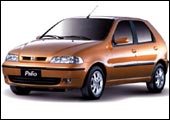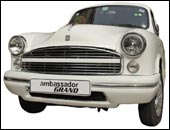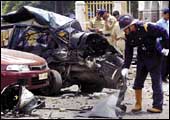 |
 |
| Bachchan and Khan: The new
stoichiometry instructors |
This
is a new role for celeb endorsers. They've endorsed everything from
pens to financial services to colas to cars. But safety? Actually,
they'll still be selling colas, but post the pesticides-in-soft-drinks
scare, the ads are likely to be less about colas, and more about
how it is safe to drink them. Coca Cola and PepsiCo may well have
to get their endorsers-it could be Aamir Khan for Coke; Sachin Tendulkar
or Amitabh Bachchan for Pepsi-to mouth lines about how safe it is
to drink a cola. Burp!
"Our prime motive
is to clear our image with the consumer," says Rajeev Bakshi,
Chairman, PepsiCo India. "We may call in Amitabh Bachchan and
ask him to make a rational statement before moving on to the emotional
aspect." The choice of Bachchan has set the rumour mills going
about how Tendulkar, fresh from his Ferrari controversy, opted to
sit this round of commercials out. "These reports are speculative,"
says Shashi Kalathil, PepsiCo's Executive Director (Marketing).
"Besides, we would never do anything that compromises the image
of our endorsers."
Coca-Cola India plans to use Aamir Khan to
bolster its image. According to the company, it is still working
on the form and content of its image-salvage commercials. It doesn't
take rocket-science to figure out that these will be fact-heavy.
As Pepsi's Kalathil puts it, "It will involve scientific figures
and facts". Well, it'll be a refreshing change to have Aamir
Khan and Amitabh Bachchan tell us about the finer points of stoichiometry.
-T.R. Vivek
SEQUEL
Palio Redux
 |
For about a year
after its launch in September 2001, the Palio ruled Indian roads
(well, in a manner of speaking, it did). Then, news of its parent's
financial woes and its reputation as a fuel-guzzler caught up with
the marque. In April 2002, the company sold 3,985 Palios. By December,
it was selling a mere 550 a month. The company did try to halt the
slide, by upping the marketing ante, and by launching a diesel variant.
Now, almost a year after its southbound journey began, Fiat has
unveiled its long-overdue third front. On August 26, the company
launched the Palio NV. Priced marginally higher (the existing model
retails for between Rs 350,000 and Rs 412,000 depending on the model;
prices are ex-showroom Delhi), the NV is about 10 per cent more
fuel-efficient than its predecessor. The company has asked its dealers
to sponsor mileage rallies to drive home this message. Already,
on the strength of its marketing efforts and helped by the buoyancy
in the market, the Palio's sales have climbed back to 2905 (in July).
The NV may be just what's needed for the marque to retain its lost
glory.
-Swati Prasad
DASH
BOARD
 A+ A+
To the Ambassador, of which another new variant was launched recently,
purely for longevity. We promise to say no more.
 C- C-
India's Telecom Minister Arun Shourie has discovered one of the
perils of a fluid policy regime. Upset at VSNL's falling revenues,
its American shareholders-the government had promised them at the
time of VSNL's GDR issue that the company would enjoy its monopoly
in international long distance telephony till 2004; it actually
lasted till 2002-have filed a class action suit. That hits VSNL's
current owner the Tata Group , but surely Shourie knows all about
the concept of moral responsibility.
Should Mumbai Worry?
For now the commercial capital seems unshaken.
 |
| A fire fighter sifts through the wreckage
of cars damaged by an explosion |
Less than a month after a blast at Ghatkopar
killed four and injured 32, Mumbai was rocked by two synchronised
car bombs on August 25. When BT went to press, forty-six people
had died and more than 140 injured. The BSE Sensex plunged 145 points
soon after news of the first blast in Zaveri Bazaar reached Dalal
Street (there was another one minutes later near the Gateway of
India). But by the end of the day, it recovered to close above the
pyschologically-important mark of 4,000.
But the question is, should India's business
capital worry about its increasingly violent clime? Although this
is the sixth attack in nine months and comes after 10 years of the
most violent one in March 1993, which killed 253 people, Mumbai's
marketmen are putting up a brave front. "The fact that the
market fell and recovered towards the close suggests that based
on the present level of knowledge, the market may have discounted
the event," says U.R. Bhat, Director, J.P. Morgan. "As
for the sentiment, this is not the first one (of the blasts) in
Mumbai and so that should hopefully give confidence.''
Bhat isn't alone in discounting the effect
of the blasts on Mumbai's stockmarkets. Mitesh Mehta, Director,
K.G. Vora Securities, feels that the fall in Sensex is more due
to the expected correction and some operators booking profits rather
than a reaction to the bomb blasts. He says that a further 100-point
fall is not ruled out. "People all over the world are by now
used to such acts of terrorism and I don't think this incident will
affect the FII inflow, unless this takes a communal turn,'' says
Mehta. Hope he's right.
-Dipayan Baishya
|
